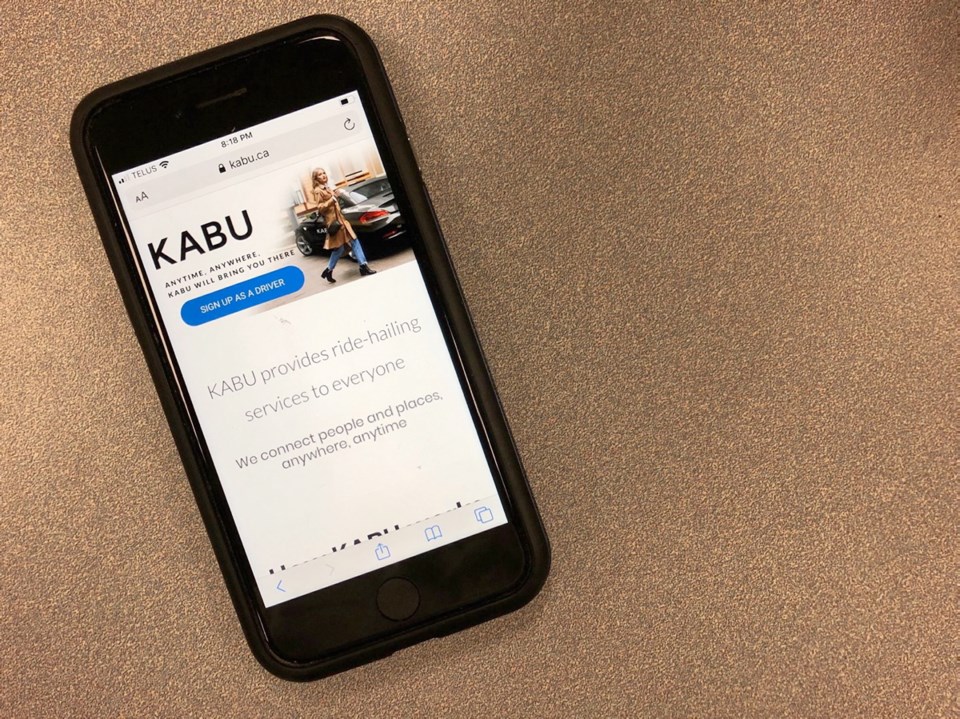Another ride-hailing company is running rubber on local roads.
But the fleet for Kabu Rides is small as the pandemic is pumping the brakes on demand, the company says.
Kabu Rides spokesman Martin Van den Hemel said only six vehicles were in operation on its opening day. It had hoped for many more until restrictions surrounding COVID-19 came into place this spring.
Van den Hemel said it will be challenging as Kabu Rides builds a customer base and adds drivers and their vehicles to its fleet to meet the demand.
“The world has changed,” he said.
When the Richmond-based company received its licence to operate here in February, Van den Hemel said customer traffic on its app was strong at between 100 and 200 requests per day. A launch was planned for April 1, with high expectations for the healthy tourism industry. Then, pandemic lockdowns and restrictions started, and Kabu Rides postponed its launch.
“We’re at the mercy of the virus,” said Van den Hemel. “We need the customers to justify the [number of] drivers.”
Lucky to Go, a Victoria-headquartered ride hailing company, is continuing the “soft launch” it started on July 1, using two or three cars to test the market for passengers and some food deliveries, said CEO Mandeep Rana. The company is operating between 3 p.m. and 10 p.m.
Lucky to Go also launched in Kelowna on July 1 and is using about 25 drivers in the Okanagan city.
The situation in Greater Victoria is a little more complicated, said Rana.
He said the major route here involves Victoria International Airport, but airport officials have yet to develop a plan to give contracts to ride-hailing companies, as it does with taxis.
“So we’re waiting for that,” said Rana. “Then we can open up all the routes.”
Lucky to Go said it is in the process of registering about 30 drivers.
Both companies face demand and driver issues amid the pandemic.
Van den Hemel said many Kabu drivers are Class 1 or Class 2 professional drivers, including long-haul truckers, but it’s their vehicles and their livlihoods and the customer base has to be there for them to make it worthwhile, he said.
“Like everyone else, we’re waiting for Phase 4 of reopening and the new normal.”
In a statement, Kabu CEO Billy Xiong said his company is eager to help locals get around.
“As B.C.’s economy slowly begins to recover, Kabu wants to be part of the solution by helping full-time and part-time drivers in Victoria and the Capital Regional District earn a living wage on a flexible schedule where they get to pick their hours,” Xiong said.
Kabu claims it charges the lowest commission rates in the industry. The company said drivers keep 80 per cent or more of their revenues during a shift, and full-time drivers qualify for subsidized health, dental, disability and illness coverage, along with a free $250,000 life insurance policy.
To drive for Kabu, drivers must have a valid Class 1, 2 or 4 licence.
The Passenger Transportation Board announced on April 22 that Lucky To Go had been approved to operate in Greater Victoria and all other regions of the province. In February, the board approved Richmond-based Kabu’s application to operate in this region.
Kabu skirted provincial rules by operating outside the regulatory framework from 2016 to 2019, saying while “operating in the grey area” it provided more than 1.3 million rides for more than 100,000 customers.
It was given another chance to comply with regulations by the Passenger Transportation Board and became the first ride-hailing company to get licences in all areas of the province.
The company’s parent firm, GoKabu, was found in contravention of the Passenger Transportation Act by serving the Chinese community in B.C. through the social media channel WeChat.
In launching its service Friday, Kabu said customers and drivers are required to wear a mask at all times inside vehicles. It said special precautions are being taken before and after every trip.



